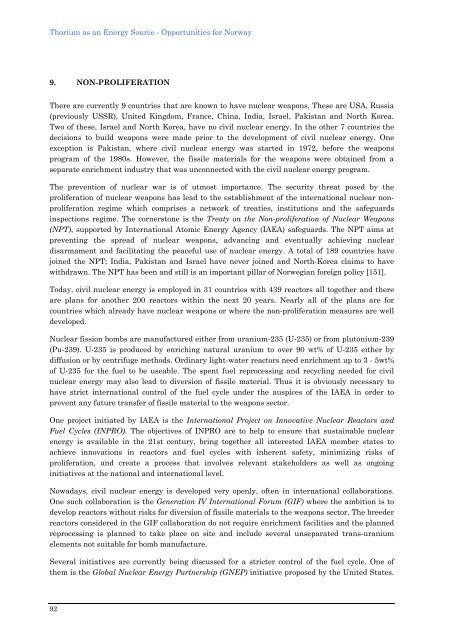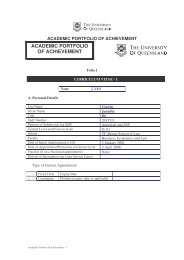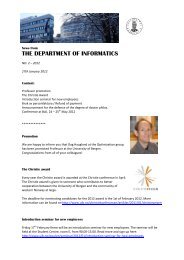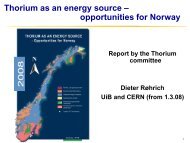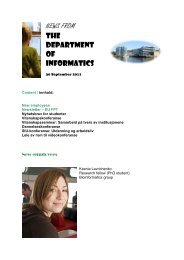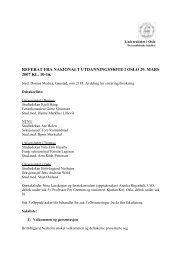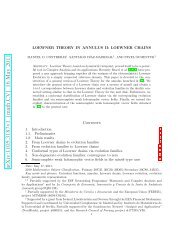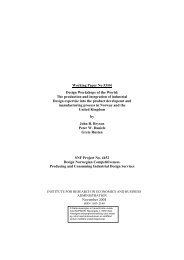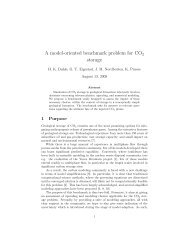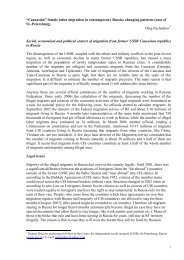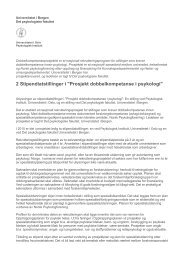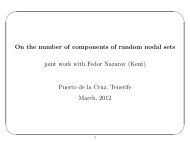THORIUM AS AN ENERGY SOURCE - Opportunities for Norway ...
THORIUM AS AN ENERGY SOURCE - Opportunities for Norway ...
THORIUM AS AN ENERGY SOURCE - Opportunities for Norway ...
Create successful ePaper yourself
Turn your PDF publications into a flip-book with our unique Google optimized e-Paper software.
Thorium as an Energy Source - <strong>Opportunities</strong> <strong>for</strong> <strong>Norway</strong><br />
9. NON-PROLIFERATION<br />
There are currently 9 countries that are known to have nuclear weapons. These are USA, Russia<br />
(previously USSR), United Kingdom, France, China, India, Israel, Pakistan and North Korea.<br />
Two of these, Israel and North Korea, have no civil nuclear energy. In the other 7 countries the<br />
decisions to build weapons were made prior to the development of civil nuclear energy. One<br />
exception is Pakistan, where civil nuclear energy was started in 1972, be<strong>for</strong>e the weapons<br />
program of the 1980s. However, the fissile materials <strong>for</strong> the weapons were obtained from a<br />
separate enrichment industry that was unconnected with the civil nuclear energy program.<br />
The prevention of nuclear war is of utmost importance. The security threat posed by the<br />
proliferation of nuclear weapons has lead to the establishment of the international nuclear nonproliferation<br />
regime which comprises a network of treaties, institutions and the safeguards<br />
inspections regime. The cornerstone is the Treaty on the Non-proliferation of Nuclear Weapons<br />
(NPT), supported by International Atomic Energy Agency (IAEA) safeguards. The NPT aims at<br />
preventing the spread of nuclear weapons, advancing and eventually achieving nuclear<br />
disarmament and facilitating the peaceful use of nuclear energy. A total of 189 countries have<br />
joined the NPT; India, Pakistan and Israel have never joined and North-Korea claims to have<br />
withdrawn. The NPT has been and still is an important pillar of Norwegian <strong>for</strong>eign policy [151].<br />
Today, civil nuclear energy is employed in 31 countries with 439 reactors all together and there<br />
are plans <strong>for</strong> another 200 reactors within the next 20 years. Nearly all of the plans are <strong>for</strong><br />
countries which already have nuclear weapons or where the non-proliferation measures are well<br />
developed.<br />
Nuclear fission bombs are manufactured either from uranium-235 (U-235) or from plutonium-239<br />
(Pu-239). U-235 is produced by enriching natural uranium to over 90 wt% of U-235 either by<br />
diffusion or by centrifuge methods. Ordinary light-water reactors need enrichment up to 3 - 5wt%<br />
of U-235 <strong>for</strong> the fuel to be useable. The spent fuel reprocessing and recycling needed <strong>for</strong> civil<br />
nuclear energy may also lead to diversion of fissile material. Thus it is obviously necessary to<br />
have strict international control of the fuel cycle under the auspices of the IAEA in order to<br />
prevent any future transfer of fissile material to the weapons sector.<br />
One project initiated by IAEA is the International Project on Innovative Nuclear Reactors and<br />
Fuel Cycles (INPRO). The objectives of INPRO are to help to ensure that sustainable nuclear<br />
energy is available in the 21st century, bring together all interested IAEA member states to<br />
achieve innovations in reactors and fuel cycles with inherent safety, minimizing risks of<br />
proliferation, and create a process that involves relevant stakeholders as well as ongoing<br />
initiatives at the national and international level.<br />
Nowadays, civil nuclear energy is developed very openly, often in international collaborations.<br />
One such collaboration is the Generation IV International Forum (GIF) where the ambition is to<br />
develop reactors without risks <strong>for</strong> diversion of fissile materials to the weapons sector. The breeder<br />
reactors considered in the GIF collaboration do not require enrichment facilities and the planned<br />
reprocessing is planned to take place on site and include several unseparated trans-uranium<br />
elements not suitable <strong>for</strong> bomb manufacture.<br />
Several initiatives are currently being discussed <strong>for</strong> a stricter control of the fuel cycle. One of<br />
them is the Global Nuclear Energy Partnership (GNEP) initiative proposed by the United States.<br />
92


